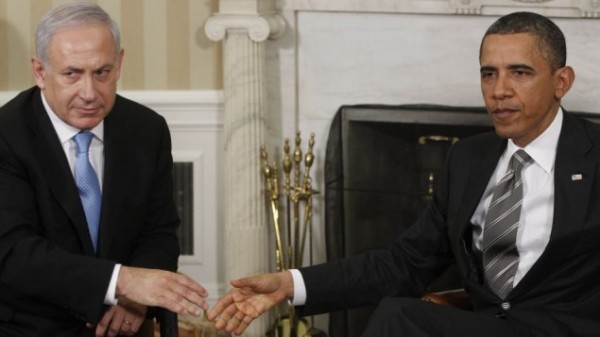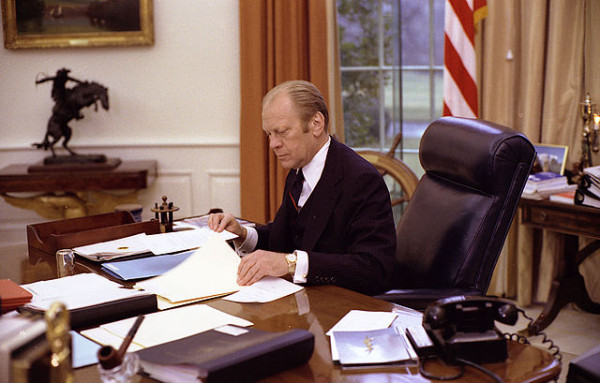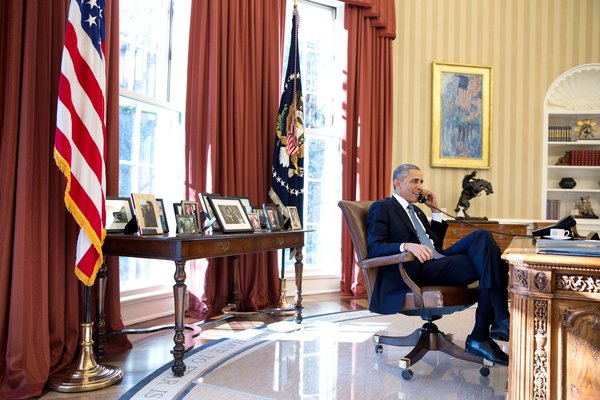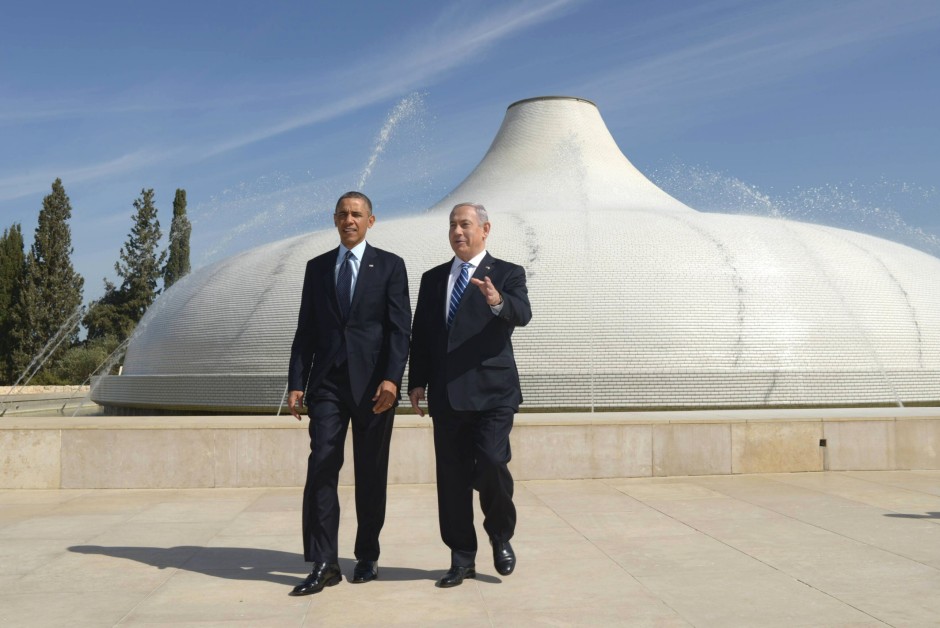The shaky relationship between Barack Obama and Benjamin Netanyahu has grown progressively worse in the past three weeks due to Netanyahu’s hardline policies and cynical electioneering tactics and Obama’s cold calculation that he can politically afford to say and do what what he pleases in the homestretch of his presidency.
And because both sides are convinced that they’re on the side of the angels, the current acrimony may linger on indefinitely.
The chill in Israel’s bilateral relations with the United States may be jolting and disturbing, but it does not affect the $3 billion a year package of U.S. military aid to Israel. Nor does it appear to have an impact on intelligence cooperation.

And as Israel’s ambassador to the United States, Ron Dermer, correctly observed the other day, the 67-year history of the United States’ relations with the Zionist movement and Israel is replete with differences over policy.
Some examples:
Harry Truman wavered as several of his key cabinet ministers expressed opposition to Jewish statehood. Dwight D. Eisenhower threatened to impose sanctions if Israel did not withdraw from the Sinai Peninsula. John F. Kennedy piqued Israel with his insistence that its nuclear facility in Dimona should be open to regular inspections. Lyndon B. Johnson left Israel seething on the eve of the Six Day War after one of his top officials said that Washington would be neutral in word, thought and deed. Richard Nixon temporarily withheld badly needed military supplies to Israel during the Yom Kippur War.
Gerald Ford threatened to reassess Washington ties with Israel. Jimmy Carter pressured Menachem Begin to dismantle settlements in the Sinai Peninsula. Ronald Reagan suspended the flow of sophisticated aircraft to Israel. George H. Bush cut off loan guarantees to Israel as Yitzhak Shamir continued to defy Washington and build settlements in the West Bank.

Bill Clinton and George W. Bush had few, if any, quarrels with Israel. But Clinton’s Camp David peace proposals and Bush’s advocacy of Palestinian statehood alienated right wingers in Israel.
And now Obama and Netanyahu have clashed in public, bringing into sharp relief their diameterically opposed views/visions over Iran’s nuclear program, the Arab-Israeli dispute and even the status of Arabs in Israeli society.
Obama — a liberal — and Netanyahu — a conservative — have not been on the same page from day one.
In 2009, Obama pressured Netanyahu to declare support for a demilitarized Palestinian state. A year later, in response to American prodding, Netanyahu announced a partial settlement freeze in the West Bank. Like his predecessors, Obama has described Israeli settlements in the West Bank as obstacles to peace. Hardening this formula, he called the settlements “illegitimate.”
Obama’s disagreement with Netanyahu over this pivotal issue came to a head in discordant fashion after Israel announced the expansion of a settlement during Vice President Joe Biden’s visit to Jerusalem.
The latest tensions in Israeli-American relations surfaced after the Speaker of the U.S. House of Representatives, John Boehner, invited Netanyahu to address a joint session of Congress on Iran. Boehner, a Republican, did not bother consulting the White House. Israel blatantly broke diplomatic protocol by failing to inform Obama that Netanyahu had accepted Boehner’s invitation. By doing so, Netanyahu thumbed his nose at Obama and damaged the spirit of bipartisan congressional support for Israel.
In his speech, Netanyahu blasted the emerging nuclear deal between the major powers and Iran, calling it a “very bad” agreement. Urging the United States to scrap it altogether, he advised Washington to hold out for much better terms.
According to Israeli cabinet minister Yuval Steinitz, Iran is the main cause for recent tensions with the United States. This is certainly an important issue, but as Dermer has warned, the existing rancor will deepen should the United States and its partners sign an accord with Iran.
In a sign of the times, The Wall Street Journal reported that Israel has spied on the nuclear negotiations. Israel heatedly denied the accusation. In any case, the United States had already stopped supplying Israel with sensitive details about the talks, implying that Israel was using the information to sabotage them.
After Netanyahu renounced his support for a two-state solution in the final hours of the election campaign, thereby foreclosing the chance to resolve the conflict with the Palestinians, he backtracked. “I don’t want a one-state solution,” he said, responding to sharp international criticism. “I want a sustainable, peaceful two-state solution, but for that, circumstances have to change.”
Netanyahu’s rationale is self-serving and disengenuous.
Given his abysmal record on peace, the “circumstances” will never change and there will never be a right time for Palestinian statehood. In essence, Netanyahu’s strategic goal is to manage rather than to resolve the conflict with the Palestinians.
Netanyahu’s commitment to Palestinian statehood has always been highly questionable, judging by the failure of last year’s peace talks — for which his government must assume prime responsibility, as U.S. Secretary of State John Kerry claimed — his expansion of settlements, and his constant demonization of Mahmoud Abbas, the president of the Palestinian Authority and Israel’s most reliable and sincere Palestinian partner since 1948.
Netanyahu’s insistence on obtaining Palestinian recognition of Israel as a Jewish state is superfluous, feeding into widespread suspicious that he will stop at nothing to derail an equitable peace accord. For all practical purposes, Israel is a Jewish state, and, lest it be forgotten, the Palestinians officially recognized Israel in 1993.
Apart from all these factors, the major figures in Netanyahu’s cabinet and Likud Party uniformly oppose a viable, geographically contiguous Palestinian state.
So who does he think he’s fooling?

Which is why Obama, in reference to Netanyahu’s renunciation of a two-state solution, said, “We take him at his word that it wouldn’t happen during his prime ministership.” He added, “While taking into complete account Israel’s security, we can’t just in perpetuity maintain the status quo, expand settlements — that’s not a recipe for stability in the region.”
As Obama’s chief of staff, Denis McDonough, said in a forceful speech on March 23, the two-state solution “remains our goal” and is “the only way to secure Israel’s future as a Jewish and democratic state.” Israel’s occupation of the West Bank, he went on to say, “must end.”
These may be fighting words, but they hit the mark. If Netanyahu and company remain on their ill-advised chosen path, Israel will degenerate into a binational state, ending the Zionist dream of Jewish statehood in the ancestral homeland of the Jewish people.
In light of all this, the United States should most definitely sponsor or support a United Nations two-state resolution based on Israel’s pre-1967 armistice lines and mutual land swaps. The Palestinian refugee problem should be solved within the parameters of a Palestinian state or a generous compensation/resettlement package.
If Obama waits for Netanyahu to do the right thing, he will be waiting for Godot.
Obama cannot allow the status quo to persist and fester. Washington should no longer be an enabler of Israeli foot dragging and intransigence, a role it has played far too long. Obama should use his power, moral suasion and influence to change the situation on the ground for the better.
It’s time for tough love.
The status quo is unsustainable and dangerous — for Israel, the Arab states and the United States.
Netanyahu, having been denounced far and wide for his racist comments about Israeli Arabs voting in “droves” during last week’s election, has formally apologized.
The Obama administration rightly condemned his “divisive rhetoric,” and Obama himself reminded Netanyahu that Israel was founded on the premise that all its citizens — Jews, Muslims or Christians — would be treated equally and fairly. “If that is lost,” he declared, “then I think that not only does it give ammunition to folks who don’t believe in a Jewish state, but it also, I think, starts to erode the meaning of democracy in the country.”
In his apology, Netanyahu said he viewed himself as the prime minister of “every Israeli citizen, without any prejudice based on religion, ethnicity or gender.” Yet in a glaring snub, he did not invite members of the Arab Joint List — which holds 13 Knesset seats and is now Israel’s third largest political party — to his residence, where the apology was issued.
The rebuff proved beyond any reasonable doubt that Netanyahu has a lot more work to do to improve the second-class standing of Israeli Arab citizens.
